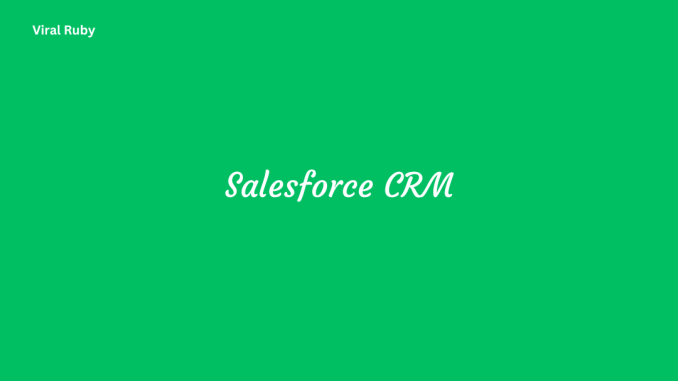
Salesforce CRM for Sales and Marketing with Features
Introduction to Salesforce CRM
Salesforce CRM (Customer Relationship Management) is a powerful cloud-based platform that helps businesses manage their customer interactions, sales processes, and overall customer data. It provides organizations with a comprehensive suite of tools and features to streamline their sales, marketing, and customer service activities.
At its core, Salesforce CRM is designed to centralize and organize customer information, enabling businesses to gain a holistic view of their customers and their interactions across various touchpoints. It offers a wide range of functionalities to enhance customer relationships and drive business growth.
Here are some key features and components of Salesforce CRM:
Contact and Account Management: Salesforce allows businesses to store and manage customer contact information, including names, addresses, email addresses, and phone numbers. It also enables the creation and organization of customer accounts, facilitating a structured approach to customer management.
Opportunity Management: Salesforce CRM provides tools for tracking and managing sales opportunities throughout the sales pipeline. It allows sales teams to record and monitor leads, track deal progress, and forecast sales revenue. This feature aids in efficient sales management and helps identify potential growth opportunities.
Sales Collaboration: The platform promotes collaboration among sales teams by providing a centralized space for sharing information, updates, and insights. It allows team members to work together, coordinate activities, and communicate effectively, enhancing overall sales productivity.
Marketing Automation: Salesforce offers marketing automation capabilities that enable businesses to create, execute, and track marketing campaigns. It allows for the segmentation of customer data, personalized messaging, and automated workflows to engage with customers at various stages of the buying journey.
Customer Service and Support: Salesforce CRM includes tools for managing customer service and support interactions. It enables businesses to track customer inquiries, log cases, and provide timely assistance. The platform also supports the creation of knowledge bases and self-service portals to empower customers to find answers to their queries independently.
Reporting and Analytics: Salesforce provides robust reporting and analytics features, allowing businesses to gain valuable insights into their sales performance, customer behavior, and marketing effectiveness. These insights can inform strategic decision-making and help optimize business processes.
Mobile and Integration Capabilities: Salesforce CRM is accessible via mobile devices, enabling users to access customer information and perform tasks on the go. The platform also offers seamless integration with other applications and systems, allowing businesses to leverage existing tools and data sources.
Key Features and Capabilities of Salesforce CRM
Salesforce CRM (Customer Relationship Management) is a comprehensive software platform that helps businesses manage and enhance their customer relationships. Here are some key features and capabilities of Salesforce CRM:
Contact and Account Management: Salesforce provides a centralized database to store and manage customer information, including contact details, interactions, and account history. This allows businesses to have a holistic view of their customers and enables personalized interactions.
Opportunity and Sales Management: Salesforce CRM offers tools to track and manage sales opportunities, from lead generation to deal closure. Sales teams can efficiently manage their pipeline, track sales activities, forecast revenue, and collaborate on deals.
Marketing Automation: Salesforce CRM includes robust marketing automation capabilities to streamline marketing campaigns, track leads, and measure campaign effectiveness. It enables targeted messaging, lead nurturing, and integration with various marketing channels.
Customer Service and Support: Salesforce CRM provides tools for managing customer service and support processes. It enables case management, ticketing, knowledge base management, and customer self-service portals. Support teams can efficiently track and resolve customer issues, improving customer satisfaction.
Analytics and Reporting: Salesforce offers powerful analytics and reporting features to gain insights into customer data, sales performance, marketing campaigns, and service metrics. Users can create customized reports and dashboards to monitor key performance indicators and make data-driven decisions.
Collaboration and Workflow Automation: Salesforce CRM facilitates collaboration among team members by providing a platform for sharing information, documents, and updates. It also supports workflow automation, allowing businesses to automate repetitive tasks, approvals, and notifications.
Mobile and Social Integration: Salesforce CRM is designed to be mobile-friendly, enabling users to access customer information, collaborate, and manage tasks on-the-go. It also integrates with social media platforms, allowing businesses to engage with customers on social channels.
Customization and App Development: Salesforce CRM offers extensive customization options, allowing businesses to tailor the platform to their specific needs. It includes a powerful development platform (Salesforce App Cloud) for building custom applications and extending functionality.
Integration and Extensibility: Salesforce CRM can integrate with various third-party applications, systems, and data sources, enabling seamless data exchange and process automation. It offers a wide range of integration options, APIs, and connectors to enhance its capabilities.
Scalability and Security: Salesforce CRM is a cloud-based solution that provides scalability to accommodate businesses of all sizes. It offers enterprise-grade security measures, including data encryption, user authentication, and access controls, ensuring the privacy and protection of customer information.
Benefits of Implementing Salesforce CRM for Sales and Marketing
Implementing Salesforce CRM can provide numerous benefits for sales and marketing teams. Here are some key advantages:
Centralized Customer Data: Salesforce CRM centralizes customer information, providing a unified view of each customer’s interactions, preferences, and purchase history. This enables sales and marketing teams to have a comprehensive understanding of their customers, leading to more personalized and targeted communication.
Enhanced Sales Productivity: Salesforce CRM automates repetitive sales tasks, such as data entry, lead tracking, and follow-up reminders. This frees up valuable time for sales representatives, allowing them to focus on building relationships and closing deals. Automation also ensures that sales processes are consistent and efficient across the team.
Improved Sales Pipeline Management: Salesforce CRM enables effective management of the sales pipeline by tracking leads, opportunities, and deals in real-time. Sales managers can easily monitor the progress of each opportunity, identify bottlenecks, and make data-driven decisions to optimize the pipeline. This visibility helps drive sales revenue and forecasting accuracy.
Streamlined Marketing Campaigns: With Salesforce CRM, marketing teams can create and execute targeted campaigns based on customer segmentation and behavior. The platform provides tools for email marketing, social media integration, and campaign tracking, allowing marketers to deliver personalized messages and measure campaign effectiveness. This leads to improved marketing ROI and customer engagement.
Better Collaboration and Communication: Salesforce CRM fosters collaboration and communication among sales and marketing teams. Users can share customer insights, updates, and collaborate on strategies within the platform. This promotes cross-functional alignment, enhances teamwork, and ensures everyone has access to the most up-to-date information.
Data-driven Decision Making: Salesforce CRM offers robust reporting and analytics capabilities, providing actionable insights into sales and marketing performance. Sales managers can analyze key metrics, such as win rates, conversion rates, and revenue forecasts, to identify trends and areas for improvement. Marketing teams can measure campaign ROI, track customer engagement, and refine strategies accordingly.
Mobile Accessibility: Salesforce CRM is accessible on mobile devices, allowing sales and marketing professionals to access critical customer data and perform tasks while on the move. This flexibility enables remote work, increases responsiveness, and enhances productivity.
Integration Capabilities: Salesforce CRM integrates seamlessly with other applications and systems, such as email platforms, marketing automation tools, and customer support systems. This enables a cohesive flow of data and streamlines workflows, eliminating manual data entry and ensuring data consistency across different departments.
Customization and Integration Options in Salesforce CRM
Salesforce CRM provides extensive customization and integration options to tailor the platform according to the unique needs and workflows of businesses. These options allow organizations to maximize the value they derive from Salesforce and integrate it seamlessly with other applications and systems. Here are the key customization and integration features of Salesforce CRM:
Custom Objects and Fields: Salesforce CRM allows businesses to create custom objects and fields to store and manage specific types of data beyond the standard out-of-the-box modules. This enables organizations to adapt Salesforce to their specific industry requirements and unique business processes.
Workflow and Process Automation: Salesforce CRM offers a powerful workflow and process automation engine known as Salesforce Automation (Process Builder and Workflow Rules). These tools allow businesses to define and automate complex business processes, including task assignments, email notifications, field updates, and approvals.
Visualforce and Lightning Components: Salesforce CRM provides frameworks like Visualforce and Lightning Components for custom user interface development. These frameworks enable businesses to create custom pages, layouts, and components to match their specific design and functionality requirements.
Custom Reports and Dashboards: Salesforce CRM allows users to create custom reports and dashboards to visualize and analyze data. Businesses can design reports and dashboards that showcase key performance metrics, sales pipeline analytics, marketing campaign insights, and other relevant information for informed decision-making.
Apex and Custom Development: Salesforce CRM supports Apex, a powerful programming language, which allows businesses to build custom functionality and automate complex business processes. With Apex, developers can create triggers, classes, and controllers to extend the capabilities of Salesforce CRM.
AppExchange: Salesforce AppExchange is an extensive marketplace that offers a vast array of pre-built integrations, applications, and components. Businesses can leverage these ready-to-use solutions to extend Salesforce CRM’s functionality and integrate with popular third-party applications such as marketing automation tools, accounting systems, and customer support platforms.
APIs and Integration Tools: Salesforce CRM provides a range of APIs (Application Programming Interfaces) and integration tools that facilitate seamless integration with external systems. Businesses can use APIs, such as REST or SOAP, to integrate Salesforce with their existing applications or build custom integrations. Additionally, Salesforce offers integration tools like Salesforce Connect and Data Loader for data synchronization and migration.
Mobile SDK: Salesforce CRM’s Mobile SDK allows businesses to build custom mobile applications and extend Salesforce functionality to mobile devices. This empowers field sales representatives, service technicians, and other mobile workers to access critical customer data, update information, and perform tasks on the go.
Single Sign-On (SSO) and Identity Management: Salesforce CRM supports various Single Sign-On protocols, enabling businesses to integrate with their existing identity management systems. This streamlines user authentication and ensures a seamless user experience across different applications.

Leave a Reply